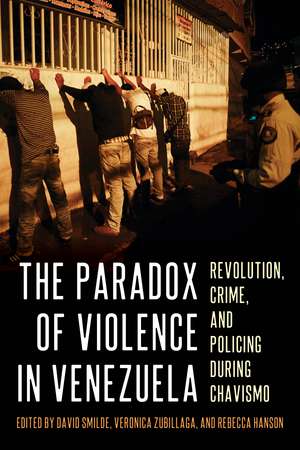The Paradox of Violence in Venezuela: Revolution, Crime, and Policing During Chavismo: Pitt Latin American Series
Editat de David Smilde, Verónica Zubillaga, Rebecca Hansonen Limba Engleză Hardback – 30 mai 2023
Din seria Pitt Latin American Series
-
 Preț: 429.67 lei
Preț: 429.67 lei -
 Preț: 450.40 lei
Preț: 450.40 lei -
 Preț: 355.58 lei
Preț: 355.58 lei -
 Preț: 431.62 lei
Preț: 431.62 lei -
 Preț: 392.66 lei
Preț: 392.66 lei -
 Preț: 388.79 lei
Preț: 388.79 lei -
 Preț: 428.14 lei
Preț: 428.14 lei -
 Preț: 362.33 lei
Preț: 362.33 lei -
 Preț: 416.05 lei
Preț: 416.05 lei -
 Preț: 393.58 lei
Preț: 393.58 lei -
 Preț: 394.57 lei
Preț: 394.57 lei -
 Preț: 389.76 lei
Preț: 389.76 lei -
 Preț: 334.31 lei
Preț: 334.31 lei -
 Preț: 388.79 lei
Preț: 388.79 lei -
 Preț: 396.85 lei
Preț: 396.85 lei -
 Preț: 350.79 lei
Preț: 350.79 lei - 17%
 Preț: 445.11 lei
Preț: 445.11 lei -
 Preț: 388.03 lei
Preț: 388.03 lei -
 Preț: 365.05 lei
Preț: 365.05 lei -
 Preț: 457.11 lei
Preț: 457.11 lei -
 Preț: 471.15 lei
Preț: 471.15 lei - 17%
 Preț: 384.07 lei
Preț: 384.07 lei -
 Preț: 428.14 lei
Preț: 428.14 lei -
 Preț: 389.17 lei
Preț: 389.17 lei -
 Preț: 394.65 lei
Preț: 394.65 lei -
 Preț: 429.89 lei
Preț: 429.89 lei -
 Preț: 392.66 lei
Preț: 392.66 lei -
 Preț: 424.88 lei
Preț: 424.88 lei -
 Preț: 389.38 lei
Preț: 389.38 lei -
 Preț: 432.57 lei
Preț: 432.57 lei -
 Preț: 419.06 lei
Preț: 419.06 lei -
 Preț: 393.58 lei
Preț: 393.58 lei -
 Preț: 354.23 lei
Preț: 354.23 lei -
 Preț: 458.07 lei
Preț: 458.07 lei -
 Preț: 389.76 lei
Preț: 389.76 lei -
 Preț: 363.26 lei
Preț: 363.26 lei -
 Preț: 502.82 lei
Preț: 502.82 lei -
 Preț: 423.91 lei
Preț: 423.91 lei -
 Preț: 395.54 lei
Preț: 395.54 lei -
 Preț: 153.64 lei
Preț: 153.64 lei -
 Preț: 351.72 lei
Preț: 351.72 lei -
 Preț: 383.01 lei
Preț: 383.01 lei -
 Preț: 393.58 lei
Preț: 393.58 lei -
 Preț: 351.55 lei
Preț: 351.55 lei -
 Preț: 351.72 lei
Preț: 351.72 lei -
 Preț: 389.76 lei
Preț: 389.76 lei -
 Preț: 331.86 lei
Preț: 331.86 lei -
 Preț: 358.46 lei
Preț: 358.46 lei -
 Preț: 362.95 lei
Preț: 362.95 lei
Preț: 330.31 lei
Nou
Puncte Express: 495
Preț estimativ în valută:
63.20€ • 66.23$ • 52.25£
63.20€ • 66.23$ • 52.25£
Carte disponibilă
Livrare economică 21 martie-04 aprilie
Livrare express 06-12 martie pentru 39.75 lei
Preluare comenzi: 021 569.72.76
Specificații
ISBN-13: 9780822947127
ISBN-10: 0822947129
Pagini: 280
Dimensiuni: 152 x 229 x 33 mm
Greutate: 0.56 kg
Editura: University of Pittsburgh Press
Colecția University of Pittsburgh Press
Seria Pitt Latin American Series
ISBN-10: 0822947129
Pagini: 280
Dimensiuni: 152 x 229 x 33 mm
Greutate: 0.56 kg
Editura: University of Pittsburgh Press
Colecția University of Pittsburgh Press
Seria Pitt Latin American Series
Recenzii
“This book defies basic assumptions about crime: while Venezuela under Chavez reduced poverty and inequality and promoted economic growth, criminality skyrocketed to unprecedented levels. This collection of brilliant studies written by frontline scholars provides responses to this riddle from various perspectives and methods, and subtly unfolds the many ways criminal violence explodes. This is a seminal work for social studies that transcends Venezuela. It provides lessons for understanding the multifaceted challenges Latin American nations must face to address public safety and social cohesion.” —Marcelo Bergman, National University of Tres de Febrero
“Besides enriching our understanding of the relationship among organized criminal groups, the Venezuelan state, and armed violence, this timely volume promises critical comparative leverage for understanding these relationships throughout the region. To take a headline example, Venezuela eclipsed Brazil in police killings of civilians in 2016, yet criminal organizations seem to have grown more organized over time. Hardline but ultimately counterproductive repression can, it would seem, appeal to many different sorts of regimes. This is both an impeccable country case study and a thoughtfully framed set of interventions designed to advance larger cross-regional and disciplinary research agendas.” —Benjamin Lessing, University of Chicago
“Besides enriching our understanding of the relationship among organized criminal groups, the Venezuelan state, and armed violence, this timely volume promises critical comparative leverage for understanding these relationships throughout the region. To take a headline example, Venezuela eclipsed Brazil in police killings of civilians in 2016, yet criminal organizations seem to have grown more organized over time. Hardline but ultimately counterproductive repression can, it would seem, appeal to many different sorts of regimes. This is both an impeccable country case study and a thoughtfully framed set of interventions designed to advance larger cross-regional and disciplinary research agendas.” —Benjamin Lessing, University of Chicago
Notă biografică
David Smilde is the Charles A. and Leo M. Favrot Professor of Human Relations at Tulane University and a senior fellow at the Washington Office on Latin America.
Verónica Zubillaga is associate professor at the Universidad Simón Bolívar in Caracas. In Caracas, together with fellow researchers, she founded Red de Activismo e Investigación por la Convivencia (Network of Activism and Research for Coexistence), an association dedicated to research and activism for the formulation of public policies that respect democratic guarantees.
Rebecca Hanson is assistant professor at the University of Florida, with a joint appointment in Sociology and Criminology & Law and the Center for Latin American Studies.
Verónica Zubillaga is associate professor at the Universidad Simón Bolívar in Caracas. In Caracas, together with fellow researchers, she founded Red de Activismo e Investigación por la Convivencia (Network of Activism and Research for Coexistence), an association dedicated to research and activism for the formulation of public policies that respect democratic guarantees.
Rebecca Hanson is assistant professor at the University of Florida, with a joint appointment in Sociology and Criminology & Law and the Center for Latin American Studies.
